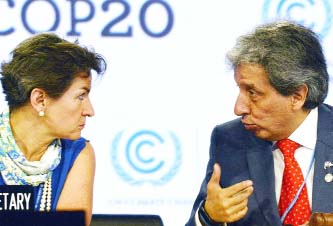
AFP, Lima :
UN climate talks spilled into an extra day Saturday as negotiators battled in Lima to end a standoff between rich and developing nations on the underpinnings of a world carbon-cutting pact.
A years-old dispute over sharing responsibility for curbing greenhouse gases reemerged to drive the 12-day negotiations into a familiar end-phase of poker-like holdout, clouding prospects for the ambitious environmental accord.
The talks had been scheduled to end at 6:00 pm (2300 GMT) Friday, but ran into the small hours as officials and ministers horse-traded over elements of a draft text.
At about 3:00 am on Saturday, the meeting secretariat announced an official postponement until 10:00 am of the closing session of a working group tasked with finalizing the document.
This must happen before the official adoption of agreements can take place in a broader plenary meeting.
Negotiators have to whittle the draft down to a consensus text to guide a process next year of declaring national pledges for curbing Earth-warming fossil fuel emissions.
“We are almost there. We need to make just a final effort,” Peruvian Environment Minister Manuel Pulgar-Vidal pleaded with negotiators on Friday afternoon.
“We need to take political decisions.”
Underlying the gridlock is the principle of “differentiation”-a bugbear of the years-long attempt to bring all the world’s nations into the fold of a single mechanism for braking planet-threatening climate change.
Developing nations insist the West must bear a bigger burden for carbon cuts, having started decades earlier to pollute their way to prosperity.
But rich countries point the finger at developing giants like China and India furiously burning coal to power their rapid growth.
UN climate talks spilled into an extra day Saturday as negotiators battled in Lima to end a standoff between rich and developing nations on the underpinnings of a world carbon-cutting pact.
A years-old dispute over sharing responsibility for curbing greenhouse gases reemerged to drive the 12-day negotiations into a familiar end-phase of poker-like holdout, clouding prospects for the ambitious environmental accord.
The talks had been scheduled to end at 6:00 pm (2300 GMT) Friday, but ran into the small hours as officials and ministers horse-traded over elements of a draft text.
At about 3:00 am on Saturday, the meeting secretariat announced an official postponement until 10:00 am of the closing session of a working group tasked with finalizing the document.
This must happen before the official adoption of agreements can take place in a broader plenary meeting.
Negotiators have to whittle the draft down to a consensus text to guide a process next year of declaring national pledges for curbing Earth-warming fossil fuel emissions.
“We are almost there. We need to make just a final effort,” Peruvian Environment Minister Manuel Pulgar-Vidal pleaded with negotiators on Friday afternoon.
“We need to take political decisions.”
Underlying the gridlock is the principle of “differentiation”-a bugbear of the years-long attempt to bring all the world’s nations into the fold of a single mechanism for braking planet-threatening climate change.
Developing nations insist the West must bear a bigger burden for carbon cuts, having started decades earlier to pollute their way to prosperity.
But rich countries point the finger at developing giants like China and India furiously burning coal to power their rapid growth.

